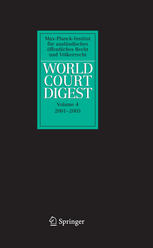

Most ebook files are in PDF format, so you can easily read them using various software such as Foxit Reader or directly on the Google Chrome browser.
Some ebook files are released by publishers in other formats such as .awz, .mobi, .epub, .fb2, etc. You may need to install specific software to read these formats on mobile/PC, such as Calibre.
Please read the tutorial at this link: https://ebookbell.com/faq
We offer FREE conversion to the popular formats you request; however, this may take some time. Therefore, right after payment, please email us, and we will try to provide the service as quickly as possible.
For some exceptional file formats or broken links (if any), please refrain from opening any disputes. Instead, email us first, and we will try to assist within a maximum of 6 hours.
EbookBell Team

4.4
72 reviewsThe first three volumes of the World Court Digest cover the periods 1986 to 1990, 1991 to 1995 and 1996 to 2000. We are happy to issue the fourth volume, covering the period from 2001 to 2005. We hope that this new Digest will be welcome to all those interested in the case law of the International Court of Justice. We are, of course, aware that nowadays the decisions of the Court are easily accessible through electronic data systems. However, there is no systematic analysis available in the form presented by the World Court Digest. Therefore, the Digest will be useful for those who wish to find the most recent position of the Court on a particular issue of international law. As the three previous volumes, also this fourth volume will be made available through electronic data on the homepage of the Max Planck Institute for Comparative Public Law and International Law. The first five years of the new century have been a busy period for the Court due to its continuing heavy caseload. The cases concerned a variety of legal issues reaching from the use of force and self-defence to questions of land and maritime boundary delimitation, immunity, consular matters, revision of judgments and the effect of provisional measures. The parties to the cases were States from all parts of the world demonstrating the general acceptance of the Court.